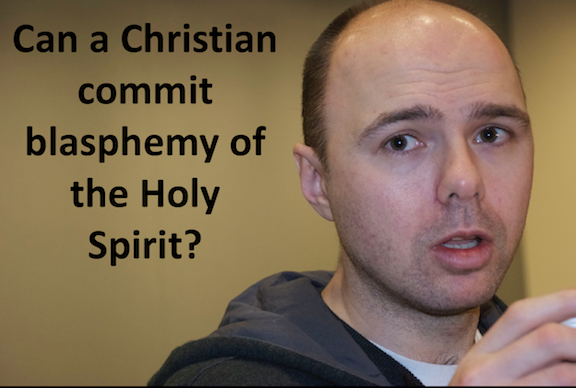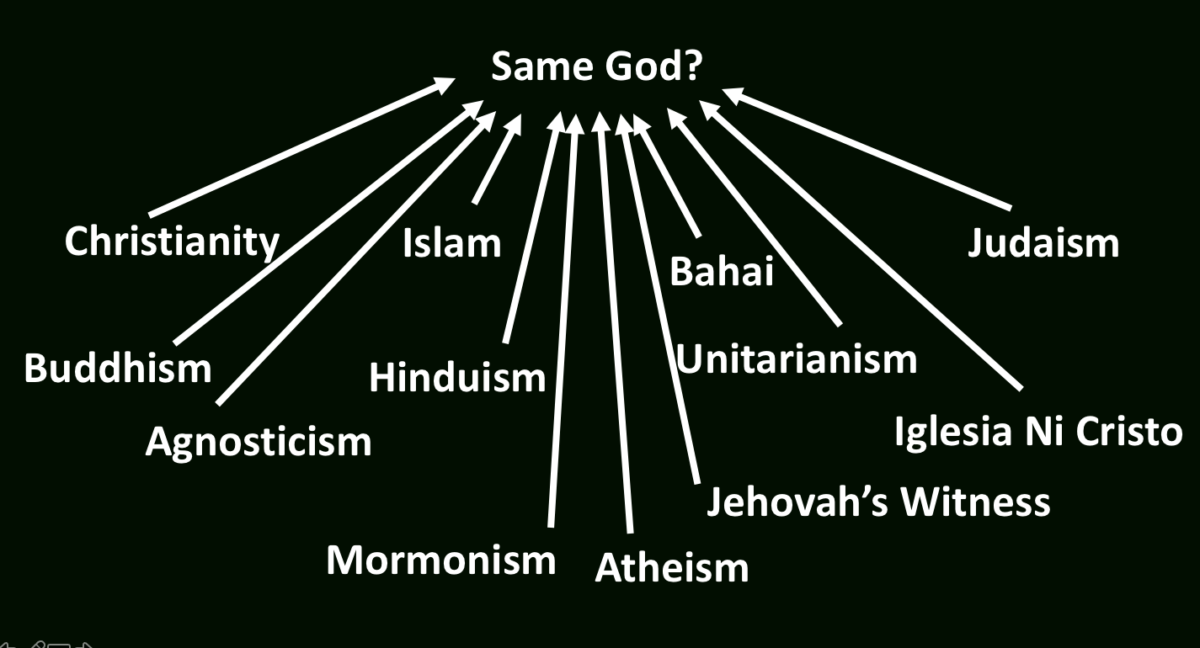“31 Therefore I say to you, every sin and blasphemy will be forgiven men, but the blasphemy against the Spirit will not be forgiven men. 32 Anyone who speaks a word against the Son of Man, it will be forgiven him; but whoever speaks against the Holy Spirit, it will not be forgiven him, either in this age or in the age to come.” Matthew 12:31-32
Many Christians fear that they have committed blasphemy against the Holy Spirit and will not go to heaven when they die. Is it possible for a Christian to commit this sin? Let us look at the context of this passage in Matthew 12:22-37 to determine first, what is blasphemy of the Holy Spirt, and second, who can commit this sin.
After Jesus healed a “blind and mute” demon-possessed man “the multitudes” asked if Jesus could be “the Son of David,” the descendant of king David who would be their Messianic King (12:22-23). The Pharisees could not deny that Jesus performed a miracle, so they attributed the power by which He cast out this demon to “Beelzebub, the ruler of the demons” (12:24). The Pharisees knew Jesus performed this miracle by the power of the Holy Spirit (cf. John 3:2), yet they offered a different explanation so that the multitudes would not conclude that Jesus was their Messianic King.
Jesus responds to this charge of the Pharisees by giving three reasons why it is false:
- Satan would not empower Jesus to cast out a demon because that would divide his kingdom and bring it to destruction (12:25-26).
- Since the Pharisees believe that Jewish exorcists cast out demons by God’s power, it is inconsistent for them to charge Jesus of casting out demons by Satan’s power (12:27). The Pharisees knew that “If” Jesus casts out demons “by the Spirit of God” (and He does), then it means “the kingdom of God has come upon them” (12:28).
- Before a robber can enter a strong man’s house, he must have more power to subdue the strong man, meaning if Christ can cast out a demon He must be stronger than Satan (12:29). But Satan would not give Jesus more power than his own. So Jesus refutes this false charge of the Pharisees on three counts.
Jesus invites the crowd to decide to either be “with” Him or “against” Him (12:30). Then He acknowledges that a God-Man (“Son of Man”) living among people may not be fully understood so He says, “Anyone who speaks a word against the Son of Man, it will be forgiven him” (12:32a). It is possible for a non-Christian to blaspheme (“slander, defame, speak against”) Christ and later seek His forgiveness as in the case of Saul (Acts 9:3-5; 26:9-11; Philippians 3:6, 9; cf. Luke 23:34). However, “whoever speaks against the Holy Spirit…will not be forgiven” (12:32b).
“Blasphemy” (12:31) has the idea of uttering false charges which defame or damage another person’s reputation. In this historical context, blasphemy of the Holy Spirt involved attributing to Satan the works which were knowingly performed by the power of the Holy Spirit through Jesus Christ. The religious leaders of Israel, the Pharisees, knew that what Jesus did was the work of the Holy Spirit. They knew Jesus was from God because no one could perform the miracles that He performed unless “God was with Him” (John 3:2). Yet they knowingly attributed the work of the Holy Spirit through Jesus to Satan.
Notice what Jesus does not say. He does not say that blasphemy of the Holy Spirit cannot be forgiven by God or is impossible for God to forgive. No, He says blasphemy of the Holy Spirit “will not be forgiven men…will not be forgiven him” (12:31b, 32b). God is willing and able to forgive any all sins (cf. Psalm 103:2a, 3a; Isaiah 38:17; Micah 7:19b). He is also willing and able to forgive those who seek His forgiveness (Psalm 86:5; Acts 10:43). The form of the Greek statement in Matthew 12:32 is not saying that blasphemy of the Holy Spirit cannot be forgiven. It is saying that there is no case or example of forgiveness for this sin “in this age or in the age to come” (Matt. 12:32). So instead of referring to blasphemy of the Holy Spirit as “the unpardonable sin,” it is more accurate to refer to it as “the unpardoned sin.”
Can a Christian commit blasphemy of the Holy Spirit? Absolutely not, because the Word of God clearly teaches that anyone who believes in Christ receives at that moment a positional forgiveness for all of his sins – past, present, and future (Acts 10:43; Ephes. 1:7; Col. 2:13-14). This forgiveness is perfect, complete, and permanent (Heb. 10:10-18). Therefore, a non-Christian who later believes in Christ for eternal life is not capable of blaspheming the Holy Spirit because he seeks and obtains God’s unlimited forgiveness when he believes in Jesus for His gift of salvation (Acts 10:43; Ephes. 2:8-9). It is also impossible for a Christian to commit this sin because he not only has permanent positional forgiveness of sins the moment he believed in Jesus (Acts 10:43), but he also has available to him when he confesses his sin, God’s daily fellowship forgiveness (I John 1:9; cf. Matthew 6:12, 14-15).
What causes the blasphemy of the Holy Spirit? In Matthew 12:33-37, Jesus teaches that a person’s words reflect the condition of his heart. The words of the Pharisees were a manifestation of their hardened hearts (cf. Matt. 15:19 which says “blasphemies” arise out of an evil “heart”). It takes a hardened heart to recognize the power of the Holy Spirit and then knowingly attribute that power to Satan. The Pharisees knew Jesus was from God (John 3:2), yet they attribute the power of the Holy Spirit working through Him to the devil. Although the Pharisees had been given an enormous amount of light from Jesus who is “the Light” (John 1:4-9; 8:12), they deceitfully attribute it to the kingdom of Satan. The Pharisees knew Jesus healed the demon-possessed man by the power of the Holy Spirit, yet they offered a different explanation to deceive the crowds from moving toward faith in Jesus as their Messianic King. So instead of Jesus being recognized as God in human flesh (John 1:1, 14), He was regarded as the incarnation of Satan!
Any individual or religious system that attributes the power of God in and through Jesus Christ to Satan will not be forgiven because his heart (or their hearts are) is too hardened to seek God’s forgiveness through faith in Jesus Christ. In fact, any individual or religious system that denies that “Jesus is the Christ,” the Messiah-God in human flesh who is equal with God the Father, is “antichrist” (I John 2:22-23).
In summary, what is blasphemy of the Holy Spirit? It is knowingly attributing the work of the Holy Spirit through Jesus Christ to Satan. Who can commit blasphemy of the Holy Spirit? Non-Christians whose hearts are too hardened to seek God’s forgiveness through faith in Jesus Christ (Acts 10:43).
If you are afraid of having blasphemed the Holy Spirit, ask yourself, “Am I willing to seek God’s forgiveness for this? Do I believe in Jesus Christ alone to give me eternal life and complete forgiveness of all sins (John 3:16; Acts 10:43)? If so, according to Jesus Christ, you will go to heaven. Sometimes Christians are overly introspective and miss out on the joy of being forever secure in Christ. Doesn’t that sound like the work of the devil who has “come…to steal…kill, and to destroy” (John 10:10a) the joy of believers being secure in Jesus Christ? Dismiss the devil’s lies and embrace the truth that you are forever secure the moment you believe in Jesus for His gift of everlasting life (John 3:16; 6:35-40; 10:28-29).










